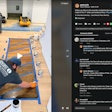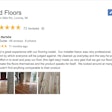

In researching this article, I had what I thought was a bright idea. Why not pull out the local telephone book and thumb through the Yellow Pages until I find the names of several hardwood floor retailers? Then I could go to the Internet and begin checking the popular search engine Yahoo to see if they were registered. After all, I reasoned, Yahoo is one of the major search engines hardwood floor retailers should use to register their Web site.
When I checked out the Web sites of five hardwood floor retailers, however, only one was registered with Yahoo. That's not uncommon in retailing, according to retail analysts. But those analysts point out that not registering a Web site doesn't make much business sense.
As Wally Bock, a Wilmington, N.C.-based marketing consultant and author of Briefing Memo, an electronic business newsletter, explains: "Not registering a Web site is like opening up a brick and mortar store in an airplane hangar. Who is going to find it?"
Bock's question gets at the heart of retailing on the World Wide Web. Many businesses, including hardwood floor manufacturers and retailers, hope that the money will start rolling in once they establish their Web sites. However, thousands of businesses are flocking to the Web daily, making cyberspace an increasingly competitive environment. More than a million commercial sites are now on the Web, and recent research estimates that e-commerce will have grown to $20 billion for the year 2000, up from $2 billion in 1997.
"How is anyone going to find me in that vast universe?" says Reid Carr, account executive with the Eugene, Ore.- and Los Angeles-based Prentiss, Bernstein and Jones Corp., an advertising agency specializing in getting businesses onto the Web effectively. "That's the question those in the hardwood floor industry need to ask themselves constantly."
"Nobody was out in cyberspace when we set up our Web site three years ago," says Frank Rosso, owner of the Hardwood Flooring Centre in Toronto. "Now thousands of businesses have Web sites. So to develop an effective Web site that works, a dealer needs to think through the entire process of creating one."
Frank Paolino, CEO of Maysoft, a company that builds business Websites, says many retailers lack patience. "I can't tell you the number of retailers who say to me, 'I'm not making money, so constructing and maintaining a Website isn't worth it,'" Paolino explains. "That's shortsighted. They are waiting for the wave to come before they get their surfboard out."
At this stage of its development, the Web has few rules, and hardwood floor retailers need to be sharp about their business strategy if they want to avoid the minefield of mistakes that can ruin their best-laid plans. What follows are ten pitfalls to avoid and how to fix them.
1. Not having a strategic business plan
"Most of my competitors have an online store so I need to have one" is a lousy reason for hardwood floor retailers to develop a Web site. While it's true that retailers nowadays need a Web site to be considered a viable business, they should first spend considerable time planning how they can add true customer value to their site. This strategic plan should make practical business sense and be in line with a retailer's existing objectives.
"Our Web site is integrated into our overall strategic plan," says Bill Clossin, vice president of marketing at Harris Tarkett, a hardwood floor manufacturer in Johnson City, Tenn. "It's part of our three-prong marketing strategy that also includes our catalog and the point of-sale in our stores." But as Stephen Moen, vice president for the Waukesha, Wis.-based Aspen Consulting, points out, "Businesses can fail on the Web, just as they do in the brick and mortar world, because their strategic plan doesn't change. They become too fixated on their initial Web business strategy. Growth requires change and risk. These are constant factors all businesses must address."
2. Not remembering the basics
The basics means simple but important things, like remembering to put your Web address on all the store's printed material, or the telephone number and the mailing address of your brick and mortar store on your Web site. "Our Web site is the most comprehensive source about our business, so everything from our business cards to our promotional brochures need to have our URL (Web site address) on them, "says Kevin Pennington, owner of Pennington Hardwoods, a retailer in Clarksville, Ind. "Doing that is central to our marketing strategy."
Don't forget to advertise your Website constantly both offline and online, using everything from promotional materials, press releases and newspaper ads to business letterheads. Moreover, talk it up with your customers, suppliers, and friends, letting them know that you are doing business on the Web. "A hardwood floor dealer needs to get employees talking about the Web site," Rosso says.
To ensure that you don't end up red-faced later by forgetting the basics, have someone you trust outside your business take a look at your Web site. The editor you choose could be a friend or even your mother. "They will ask you a lot of 'dumb' questions that you need to answer," Pennington says.
3. Not keeping the customer in mind
Forget the long-winded mission statements, those pictures of yourself or your helpers and family, and the boring A-to-Z company history.
"All that's a waste of time because the customer doesn't care," Bock says bluntly. "In designing your Web site, avoid self-indulgence and keep your customers' needs in mind."
The customer's perspective should be at the center of your hardwood floor operation, which means jargon should be avoided at every instance. Most e-retailers, for example, index "apparel" as opposed to "clothes," a word that is more familiar to consumers.
Think like a consumer. As Clossin advises, "Don't crowd your home page with too many advertisements. This will only confuse, frustrate and possibly overwhelm the customer."
4. Not providing enough content
Studies have shown that, at this point in time, people use the Web mainly to research products before buying them at retail. Don't disappoint them or force them to go elsewhere to find the information they need.
Content is key, stresses Pennington,who advises, "Be imaginative. I've checked out several business Web sites, and all they have is some promotional jargon and some price sheets, and that's about it."
5. Not letting customers know where you are
This is the biggest mistake many businesses make on the Web. You may have the coolest, most appealing and content-rich Web site, but if you don't promote it the right way, few customers are going to find you.
Hardwood floor retailers can use several proven ways to promote their site. Most importantly, get your site registered with all the popular search engines and catalogs, such as Yahoo, Lycos and Alta Vista. Register it monthly because search engines are updated constantly, and you may get deleted if you don't resubmit frequently.
The unfortunate truth is that many retailers don't fully register their sites. "People should not only register 'theirname.com,' but also spend an extra $700 registering 'theirname.net' and 'theirname.org,'" explains R.W. Rushing, director of marketing with Jump.net, a Texas-based Web consulting company. "Also, they should try to think of and register near misses like 'theirnames.com' or 'their-name.com.' — as many as they can afford."
You will have to work hard, though, to get the word out about your Website. "It used to be much easier to get a Web site listed with a search engine," Pennington says. "The new trend is toward having humans compile the Web directories. Yahoo is an example. They really scrutinize the content on your Web sites and will even reject indexing content that has misspellings. Not only does the grammar have to be good, but so does the content. It has to be interesting and compelling."
6. Not providing enough money for maintenance
The old adage "you can't get something for nothing" best describes Web management. "The biggest problem we see in Web retailing is the fact that retailers don't budget enough for maintenance," says Gayley Knight, a consultant with Connecting Links, a Web strategy development firm.
The site's content has to be kept current and its links updated, and its look appealing. Money has to be spent on a continuing basis to support the site's technical, logistical and marketing functions. Then there's the customer e-mail that will surely come. It should be answered within 24 hours or less.
7. Not keeping it fresh
Don't forget that a Web site works exactly like a brick and mortar store. Fail to change and the customer will get tired of you. Web consultants suggest redesigning the site at least once annually to keep the customer interested. Meanwhile, plan to change content and make sure that the links aren't dead.
"Keeping a Web site fresh can be a daunting task for many retailers, since they are also trying to focus on their brick and mortar stores, as they should. They often get frustrated, realizing that the payback may not come for months, if not years, later," says Jim Dion, a senior partner with the Chicago-based retail consulting firm of J.C. Williams Group.
8. Using too many graphics
Don't try to dazzle your customers with graphics. "If that entry page to a retailer's Web site doesn't load in 12 seconds or less, then he is dead, because the customer is going to leave," Bock warns. The average American consumer has less than a 28.8 dial-up modem access at home. That's why Jim Dion advises, "Always try your Web site on a 14.4 dial up using 600-by-400 screen resolution with a browser of the 1.0 or 2.0 release and see what it looks like. The design has to be geared to the lowest common denominator."
9. Giving your customer a reason to leave
Make sure your site has quality content— that is, a clear reason why a customer should stay at your site. Emphasize what's important. Make sure your links aren't confusing or misleading, and organize your site according to what the customer wants to know, not what you want to show him. "Two-thirds of the people who come to your site won't scroll Web pages," Bock says. "So if they don't see it, they figure it's not there and off they go."
10. Not realizing the ruleswill change
Fixing mistakes one through nine is just the beginning. Don't get smug, continuing to do business as usual, and expect to survive. The Web is a revolutionary medium. "Keep up with online business trends as if the life of your Web store depends on it," Bock advises. "It may, because the online rules are constantly going to change."






























